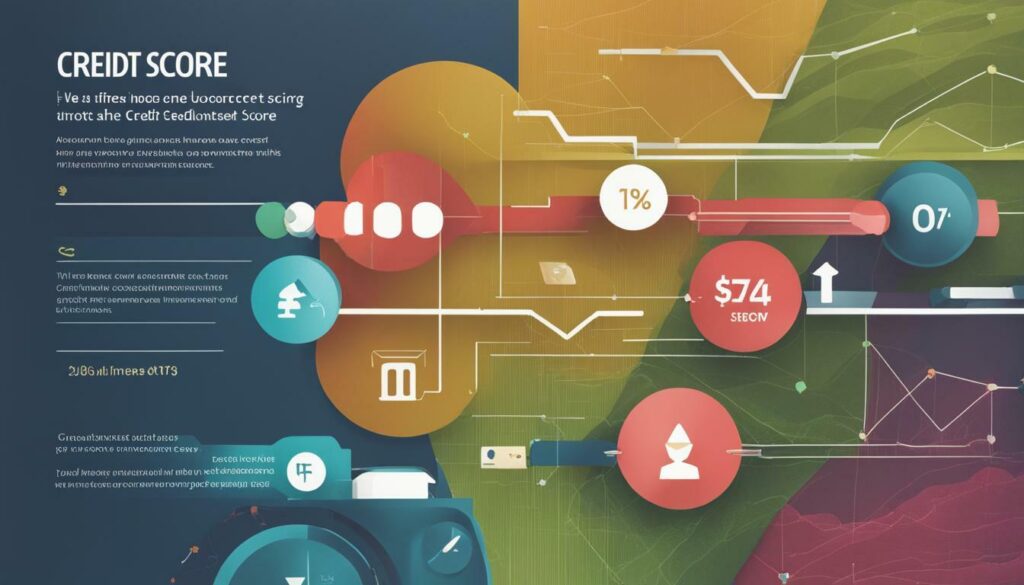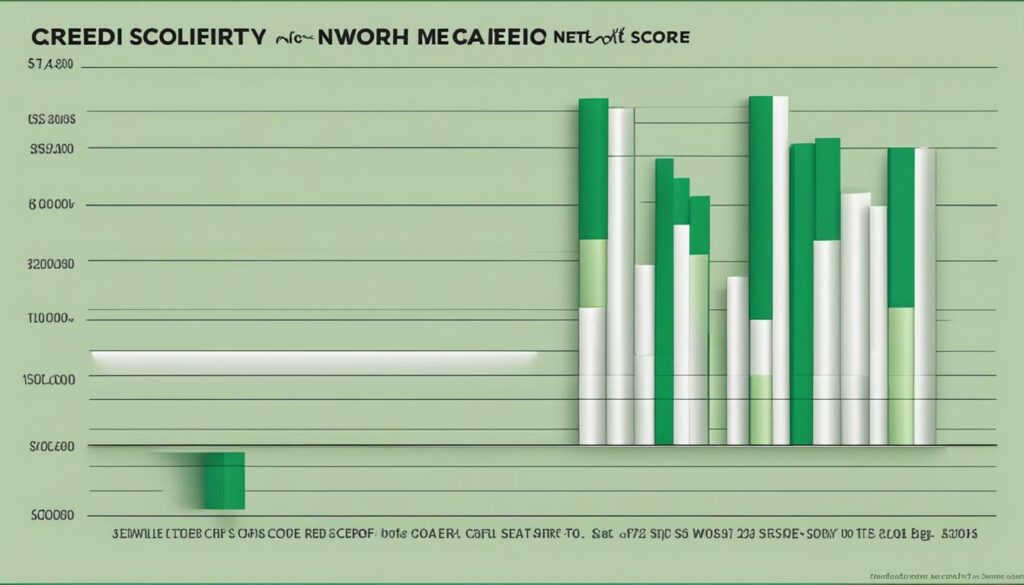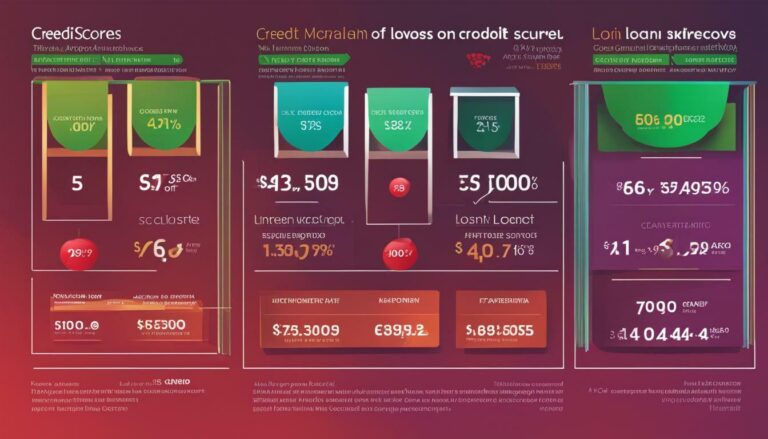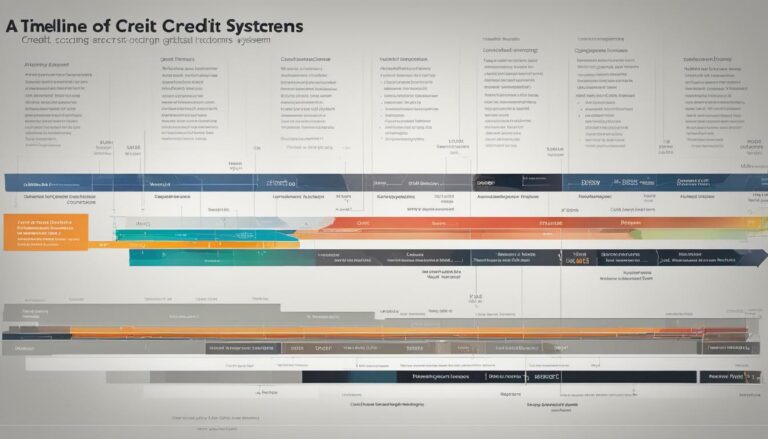Uncover Truth: Credit Score Myths and Misconceptions Debunked

Credit scores can be a complex topic, but it’s essential to separate fact from fiction when it comes to understanding your creditworthiness. In this article, we will debunk popular credit score myths and misconceptions, providing you with the knowledge to make informed financial decisions.
- Checking your credit score does not lower it.
- Carrying a balance on your credit card does not boost your credit score.
- Your income does not directly affect your credit score.
- A good credit score does not mean you’re rich.
- Having a perfect credit score does not provide additional benefits.
Now that we’ve set the record straight on these common credit score misconceptions, let’s dive deeper into each myth to gain a clearer understanding of how credit scores truly work.
Myth: Checking your credit score lowers it.
Contrary to popular belief, checking your credit score does not lower it. Many people fear that simply viewing their credit score could negatively impact their overall creditworthiness. However, this is a common misconception that can lead to unnecessary worry and confusion.
When you check your credit score, it is considered a “soft pull” or a “soft inquiry.” Soft inquiries do not affect your credit score because they are not initiated by a lender or creditor. Instead, they occur when you personally request your own credit score or when it is checked for informational purposes, such as during pre-approval processes or personal financial management.
| Myth: | Fact: |
|---|---|
| Checking your credit score lowers it. | Checking your credit score does not lower it. |
| Soft inquiries hurt your credit score. | Soft inquiries have no impact on your credit score. |
| Only lenders can check your credit score without affecting it. | You can check your credit score without it affecting your credit. |
Monitoring your credit score regularly is a responsible and proactive way to stay informed about your financial health. It allows you to identify any potential errors or discrepancies early on and take the necessary steps to rectify them. By staying aware of your credit score, you can make informed decisions and improve your financial well-being.
🚨 TUIC Errors + Low Credit Score?
CreditScoreIQ helps you build credit faster by reporting utility bills to all 3 bureaus—while you dispute errors.
Start Building Credit Today →
It is essential to debunk the myth that checking your credit score lowers it. This misconception originates from a misunderstanding of how credit inquiries work. There are two types of credit inquiries: soft inquiries and hard inquiries.
Soft inquiries do not impact your credit score and can be initiated by yourself or by potential employers, landlords, or insurance companies. On the other hand, hard inquiries, typically initiated by lenders or creditors when you apply for credit, do have a slight negative impact on your credit score. However, the effect is minimal and temporary, lasting only a few months.
So, rest assured that checking your credit score will not harm your creditworthiness. In fact, regularly monitoring your credit score can help you stay on top of your financial standing and take proactive steps towards improving it if necessary.
Myth: Carrying a balance on your credit card boosts your credit score.
It’s time to debunk the myth that carrying a balance on your credit card is beneficial for your credit score. Many people believe that by keeping a balance on their card, they are demonstrating responsible credit usage and improving their creditworthiness. However, this is not the case. Carrying a balance on your credit card can actually harm your credit score and financial health.
One of the key factors that influence your credit score is your credit utilization ratio, which is the amount of your available credit that you are currently using. It is calculated by dividing your credit card balances by your credit limits. A high credit utilization ratio indicates that you are using a significant portion of your available credit, and this can negatively impact your credit score.
By carrying a balance on your credit card, you are effectively increasing your credit utilization ratio, which can result in a lower credit score. It is advisable to keep your credit utilization ratio below 30% to maintain a good credit score. Paying off your credit card balance in full each month is the best practice to avoid incurring unnecessary interest charges and to keep your credit utilization ratio low.
| Myth | Reality |
|---|---|
| Carrying a balance on your credit card boosts your credit score. | False. Carrying a balance can harm your credit score by increasing your credit utilization ratio. |
Remember, having a good credit score is essential for various financial opportunities, such as obtaining favorable loan terms, renting an apartment, or even securing a job. It is crucial to develop responsible credit habits, such as paying your credit card balances in full and on time, to maintain a healthy credit score.

- Carrying a balance on your credit card does not boost your credit score; it can actually harm it.
- Your credit utilization ratio, the amount of your available credit that you are currently using, is a critical factor in determining your credit score.
- It is recommended to keep your credit utilization ratio below 30% to maintain a good credit score.
- Paying off your credit card balance in full each month is the best practice to avoid unnecessary interest charges and keep your credit utilization ratio low.
By understanding the truth behind this credit score myth, you can make informed financial decisions and effectively manage your credit to improve your overall financial well-being.
Myth: Your income affects your credit score.
Your income may play a crucial role in your financial life, but it has no direct effect on your credit score. Your credit score is determined by various factors, such as your payment history, credit utilization, length of credit history, types of credit, and recent credit inquiries. These factors reflect your financial responsibility and how you manage your credit, not your income level.
It’s important to understand that credit scoring models do not consider income as a determining factor in calculating your credit score. This means that even if you have a high income, it doesn’t guarantee you a good credit score. Similarly, if you have a low income, it doesn’t automatically mean you will have a poor credit score. Your income is not reported to credit bureaus and does not appear on your credit report.
The key elements that influence your credit score are your payment history and credit utilization. Making timely payments and keeping your credit card balances low are crucial for maintaining a good credit score, regardless of your income. It’s important to develop good financial habits and manage your credit responsibly to build a positive credit history over time.

In conclusion, your income does not directly impact your credit score. It’s your financial decisions, payment history, and credit utilization that have the greatest influence on your creditworthiness. By understanding the true factors that affect your credit score, you can make informed financial decisions and work towards improving your credit standing.
Myth: A Good Credit Score Means You’re Rich
Don’t be fooled – a good credit score does not equate to being wealthy. While having a good credit score is certainly beneficial, it is important to understand what it truly signifies. A credit score is a numerical representation of your creditworthiness, based on factors such as your payment history, credit utilization, length of credit history, and types of credit accounts.
An excellent credit score indicates that you have a strong history of responsible financial behavior and are likely to repay borrowed funds on time. This means that lenders and creditors are more likely to view you as a low-risk borrower and are willing to offer you favorable terms and interest rates. However, it does not mean that you are automatically wealthy or have a high income.
“A credit score is a reflection of your creditworthiness, not your bank account balance.”
Whether you have a good credit score or not, your income level is not a factor considered in credit scoring models. Your credit score is solely based on your credit history and how you manage your debts and financial obligations. It is a snapshot of your financial responsibility, not a reflection of your overall financial status.
So, while a good credit score can open doors to financial opportunities and better loan terms, it is important to remember that wealth and income are separate from your creditworthiness. Building and maintaining a good credit score is a valuable financial goal, but it is just one piece of the puzzle when it comes to your overall financial wellbeing.

| Key Points | Factual Data |
|---|---|
| A good credit score does not mean you’re rich. | A credit score is a numerical representation of creditworthiness. |
| Income level is not a factor in credit scoring models. | Credit scores are based on credit history and financial responsibility. |
| A good credit score can lead to better loan terms and financial opportunities. | A good credit score is valuable but does not equate to wealth. |
Myth: Having a perfect credit score provides additional benefits.
While a perfect credit score is impressive, it may not offer as many extra benefits as you might think. Achieving a perfect credit score, typically considered to be 850, means that you have demonstrated exceptional creditworthiness and financial responsibility. Lenders view individuals with perfect credit scores as low-risk borrowers, which can potentially lead to more favorable interest rates and credit deals. However, it is important to note that a credit score of 760 or above already qualifies you for the best deals, making the incremental benefits of a perfect score relatively minimal.
According to financial experts, the benefits of a good credit score can be obtained with a score of 760 or above. This score demonstrates that you have a solid credit history, have managed your debts responsibly, and pose a low credit risk to lenders. With a credit score of 760 or higher, you are likely to qualify for the most competitive interest rates on loans, credit cards, and mortgages. So, while a perfect credit score may be an impressive achievement, the added benefits it offers are not significantly greater than those of a very good credit score.
It is crucial to remember that a credit score is just one component that lenders consider when evaluating your creditworthiness. They also take into account factors such as your income, employment history, and debt-to-income ratio. Therefore, even if you have a perfect credit score, other financial factors can still impact the terms and conditions of your credit deals.
| Myth | Fact |
|---|---|
| A perfect credit score is necessary for the best credit deals. | A credit score of 760 or above qualifies for the best deals. |
| A perfect credit score provides additional benefits beyond a very good credit score. | The added benefits of a perfect credit score are minimal compared to a very good credit score. |
| Having a perfect credit score guarantees the most favorable interest rates. | Other financial factors, such as income and employment history, also influence interest rates. |
In conclusion, while having a perfect credit score is certainly an achievement worth striving for, it is not necessary to enjoy the best credit deals. By maintaining a credit score of 760 or above, you can still access favorable rates and terms. It is essential to focus on building and maintaining a good credit score based on responsible financial practices, rather than fixating on achieving perfection.

Myth: You should only start worrying about your credit score when you turn 18.
Ignoring your credit score until adulthood could be a costly mistake. While it might seem like something that only becomes relevant once you become financially independent, the truth is that your credit history starts forming as soon as you start using credit. The length of your credit history is an important factor in determining your creditworthiness, so it’s essential to start building a strong credit history from an early age.
Establishing good credit habits early on can set you up for financial success in the long run. By responsibly managing your credit accounts, such as a student credit card or a secured credit card, you can demonstrate your ability to handle credit responsibly. Making on-time payments and keeping your credit utilization low are key factors in building a positive credit history.
Obtaining a credit card or becoming an authorized user on a parent’s credit card are common ways to start building credit. However, it’s important to remember that credit cards are a double-edged sword. While they can provide an opportunity to establish credit, they can also lead to detrimental financial habits if misused. It’s crucial to use credit cards responsibly and avoid accumulating excessive debt.

| Key Points: |
|---|
| Start building credit as early as possible |
| Responsible credit card use is essential |
| Make on-time payments and keep credit utilization low |
Having a strong credit history is not only beneficial for future financial endeavors, such as applying for loans or renting an apartment, but it also helps you establish a positive relationship with creditors and lenders. By starting early and being proactive about your credit, you can set yourself up for a financially secure future.
Myth: Paying off credit card debt equally affects all types of debt.
Not all types of debt are equal when it comes to improving your credit score. While paying off credit card debt can have a positive impact on your score, it may not have the same effect on other types of debt, such as mortgages or student loans.
Credit scoring models take into account various factors when determining your creditworthiness. One important factor is your credit utilization ratio, which is the amount of credit you’re using compared to your total available credit. Paying off credit card debt can help lower your credit utilization ratio and improve your score.
However, when it comes to installment debt like mortgages or student loans, simply paying off the debt may not have as significant of an impact on your credit score. These types of debts are viewed differently by credit scoring models, and factors such as payment history and the length of time the debt has been open also play a role in determining your score.
The Importance of Paying off All Debts
While paying off credit card debt may not have the same impact as paying off other types of debt, it is still important to prioritize making timely payments and reducing your overall debt. Maintaining a good payment history and keeping your debt levels low can demonstrate responsible financial behavior and ultimately improve your creditworthiness.
Remember, it’s always a good idea to consult with a financial advisor or credit counseling service if you’re experiencing difficulty managing your debt or need guidance on improving your credit score. They can provide personalized advice based on your specific financial situation.
| Type of Debt | Impact on Credit Score |
|---|---|
| Credit Card Debt | Paying off credit card debt can improve your credit score by reducing your credit utilization ratio. |
| Installment Debt (Mortgages, Student Loans) | Paying off installment debt may not have as significant of an impact on your credit score, but it is still important to make timely payments. |
By understanding the nuances of different types of debt and how they can impact your credit score, you can make informed financial decisions and work towards building a strong credit profile.

Your credit score might not be visible to your employer, but your financial habits could still have an impact on your career. While employers do not have direct access to your credit score, they can request information about your debt and payment history from credit reporting agencies. This information can influence certain job opportunities, especially in roles that require financial responsibility or access to sensitive financial data.
It’s important to understand that employers typically use credit checks as part of their background screening process to assess an individual’s financial stability and trustworthiness. They are looking for signs of financial irresponsibility, such as a history of late payments or excessive debt, which could raise concerns about an individual’s ability to handle financial responsibilities in the workplace.
Therefore, it’s crucial to manage your finances responsibly and maintain a good credit history. This includes making timely payments on any debts you have, keeping credit card balances low, and avoiding excessive borrowing. By doing so, you can demonstrate good financial habits and enhance your overall employability.
| Key Points: |
|---|
| Employers cannot see your credit score directly but may access information about your debt and payment history. |
| Financial habits can impact certain job opportunities, especially those that require financial responsibility. |
| Managing your finances responsibly and maintaining a good credit history can enhance your employability. |

It’s important to take control of your financial well-being and be proactive in managing your credit. By debunking these myths and understanding the factors that truly affect your credit score, you can make informed decisions and work towards building a strong financial foundation.
Conclusion: Debunking Credit Score Myths and Misconceptions
It’s crucial to separate fact from fiction when it comes to credit scores to gain a true understanding of your creditworthiness. There are many credit score myths and misconceptions that can mislead individuals and impact their financial decisions. Let’s debunk some of the most common myths and clarify how credit scores actually work.
Firstly, one of the most prevalent myths is that checking your credit score lowers it. This is false. Checking your credit score is considered a “soft pull” and does not impact your score. So feel free to monitor your credit score regularly without worrying about any negative consequences.
Another myth is that carrying a balance on your credit card can boost your credit score. In reality, carrying a balance can actually harm your score. It’s best to pay off your credit card balances in full every month to maintain a good credit score.
Furthermore, your income does not directly affect your credit score. Credit scoring models do not consider your income when calculating your score. Instead, factors such as payment history, credit utilization, length of credit history, and types of credit used are taken into account.
Finally, having a good credit score does not automatically mean you are financially well-off. It simply means that you are a good credit risk. A good credit score opens up opportunities for better interest rates, loan approvals, and credit options, but it doesn’t reflect your income or overall wealth.
By debunking these credit score myths and misconceptions, you can have a clearer understanding of how credit scores truly work. This knowledge empowers you to make informed financial decisions and take control of your creditworthiness. Remember, your credit score is not determined by myth or misconception, but by your financial habits and responsible credit management.
FAQ
Myth: Checking your credit score lowers it.
Checking your credit score is considered a “soft pull” and does not affect your score.
Myth: Carrying a balance on your credit card boosts your credit score.
Carrying a balance on your credit card does not boost your credit score; in fact, it can harm it.
Myth: Your income affects your credit score.
Your income does not impact your credit score since it is not considered in credit scoring models.
Myth: A good credit score means you’re rich.
A good credit score does not mean you’re rich; it simply means you’re a good credit risk.
Myth: Having a perfect credit score provides additional benefits.
Having a perfect credit score does not provide any additional benefits since a score of 760 or above qualifies for the best deals.
Myth: You should only start worrying about your credit score when you turn 18.
It is important to start worrying about your credit score as soon as you turn 18, as the length of your credit history is a key factor.
Myth: Paying off credit card debt equally affects all types of debt.
Paying off credit card debt can increase your credit score, but it may not have the same effect on installment debt like mortgages or student loans.
Myth: Your employer can see your credit score.
Your employer cannot see your credit score, but they can see your debt and payment history.
Myth: Student loans do not affect your credit score.
Student loans do affect your credit score, so it is important to pay them off on time.
Myth: Getting married merges your credit score with your spouse’s.
Getting married does not merge your credit score with your spouse’s; credit reports are always individual.
Myth: Using a debit card helps build credit.
Using a debit card does not help build credit since it is not reported to credit bureaus.
Myth: Closing a credit card improves your credit score.
Closing a credit card does not improve your credit score and can actually lower it by increasing your credit utilization ratio.
Myth: Choosing “credit” on your debit card affects your credit score.
Choosing “credit” on your debit card does not affect your credit score since it is not reported to credit bureaus.
Myth: Checking your credit report hurts your credit score.
Checking your credit report does not hurt your credit score. Requesting your free annual credit reports or purchasing your credit report does not affect your credit score.
Myth: You have only one credit score.
You have multiple credit scores, as different credit reporting companies provide different scores based on various factors.
Myth: Getting loan estimates from multiple lenders hurts your credit score.
Getting loan estimates from multiple lenders does not hurt your credit score, especially if done within a short period of time.
Myth: Carrying a balance on your credit cards improves your credit score.
Carrying a balance on your credit cards does not improve your credit score; paying them off in full every month is the best way to improve or maintain a good credit score.
Myth: Paying utility bills on time directly impacts your credit score.
Paying utility bills on time may not have a direct impact on your credit score, as not all bureaus consider bill payment history.
Myth: The three major credit bureaus calculate credit scores the same way.
The three major credit bureaus, Experian, TransUnion, and Equifax, do not calculate credit scores the same way.
Myth: Every adult automatically has a credit score.
Not every adult automatically has a credit score, as some individuals may not have sufficient data to generate a score.
Ready to Improve Your Credit?
Disputing TUIC errors is step one. Step two? Boost your score by reporting utility payments with CreditScoreIQ.
Get Started Now (Only $1 Trial) →3-bureau reporting • $1M identity insurance • Dark web monitoring






